#social dilemma
Explore tagged Tumblr posts
Text
had a bad day now i’m on tumblr. my day will probably get worse due to this. not a fan of the reward system and how i am a slave to media.
3 notes
·
View notes
Text
بفتح النت زي مافتحتش، حرفيًا لا إشعارات ولا رسايل، مع حذف كل تطبيقات التواصل معيش غير تمبلر ودا تقريبًا مش بيجيلي منه إشعارات بقيت نوعًا ما حاسس بالخواء، ساعات بحسه شعور قاسي-أنك منسي- وأوقات بيكون شعور مريح بيطمن.
في كلتا الحالتين بعيدًا عن مشاعري بس دا خلاني أركز فعلًا على اللي المفروض أركز عليه زي القراءة والتعلم عامةً وخلاني أركز على مشاعري لأنها كانت مشوشة بفعل السوشيال بإعتباره مصدر إلهاء كبير.
2 notes
·
View notes
Text
Good morning, everyone!
I have a brand-new interview up with the creator of one of my favorite Inside YouTube videos: magician Michael Shaw!
Michael is a truly talented individual who not only does amazing card tricks, but he's also a skilled writer and video essayist.

Case in point: Bo Burnham but I actually shut up. Don't let the title mislead you—this is a stunningly informative and entertaining dissection of the themes of Inside and why Bo created it.
youtube
It also ends with Bo at Phoebe Bridgers' concert in 2021 when he got to hear a huge audience laugh at his clever lyrics again. I adore that video, and it's so cute that they are now a loving couple!

Anyway, please check out our interview, and keep it here for more comedy fun! ✌🏼🐔
#michael shaw#bo burnham#bo burnham inside#inside bo burnham#standupcomedyhistorian#bo burnham videos#video essay#magic#magician#card tricks#phoebe bridgers#bo and phoebe#phoebe and bo#interview#social dilemma#marshall mcluhan#medium is the massage#youtube
3 notes
·
View notes
Text
Hi! Teddie here.
In December, 2022, Oliver Misraje published this article in Zine, “The Internet is a Graveyard”. Misraje talks about four case studies in which ghosts have infiltrated the online realm – from AI "reviving" lost loved ones, to immortal memorialization on the internet, the freelance writer reveals the less-than-lively aspects of our generated world. As a philosophy fanatic, the thing that spoke out most to me in this article was Misraje’s final case study, labelled “Future Ghosts”.

Briefly, in the history of philosophy there has been endless back and forth regarding the immortality of the human soul or mind. Essentially, whether or not we exist after we die. And the implications of this reach all the way back to Plato, who claimed that death should be the philosopher’s ultimate goal, so we can more or less finally free our minds from the physical world and become omnipotent/transcendent beings.
But as someone who does consider life a wholly unique and miraculous experience, this cheap acceptance of death does not come easy, and I feel a need to believe that there is something more to the mortal world that we are missing. I think a lot of people would agree with me there.
Misraje explains, in the fourth case study of the article, an old event in 1994 where “techno-pagans” reframed the internet as more than a realm for enhanced globalization and human connection – where the internet becomes a hub for a kind of “magical evocation”. Misraje also connects this to the more recent paper by Melanie Swan, in which she coins the term “cloudminds”: a form of transhumanism (the idea that humans can evolve beyond our bodies and minds), where we have some processing power that is entirely virtual (think crypto-currency, but instead of having monetary value it makes decisions for us). We would be able to upload our minds (our experiences, memories, decisions) to an online database where our own individual knowledge and histories could connect and collectively be used in a kind of uni-mind (credit to Marvel), which could be used to solve much more difficult, large-scale human problems. Apart from completely eradicating the importance of human engineers, though, what does this mean for the rest of us? What might that tell us about life and death?
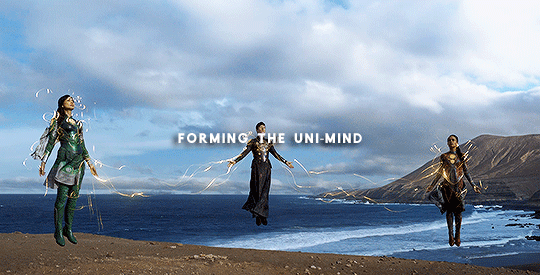
I’d love to take this in a non-conventional direction, so bear with me. Let’s pretend that the afterlife does not matter, whatsoever. It doesn’t exist, it doesn’t get experienced, it doesn’t affect anyone living or anyone dead. Imagine it as a junk drawer, or a trash bin: out of sight, out of mind. Now, we introduce this cloudmind: instead of our knowledge being carried with us into the trash, we keep a record of all of it, every experience and memory and thought. Everything except our physical bodies and brains would remain in our mortal world, where it could forever be interacted with and investigated. The living can interact with every intangible quality of the dead. Is this what it looks like to achieve immortality?
Short answer: No. Even if we could capture every essence of one person on some sort of virtual hard drive, if we could upload it into a computer so we could “ChatGPT” it, or if we could plug it into some sort of rain-proof, life-sized sex doll, this is not immortality. The essence (for lack of better term) of this being would be trapped in this state of simultaneous existence and non-existence, where it no longer feels or senses the way a human does, it doesn’t interact with its environment or manipulate the objects in its life the way a human does. Regardless of if it ever gains its own consciousness, it’s the same thing as taking a human mind and soul and welding it to a rock instead of a body – think of “Everything, Everywhere, All At Once”.
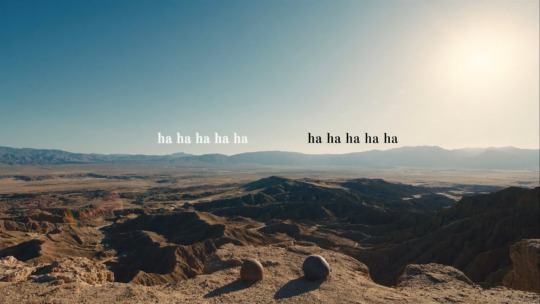

So, yes, Plato might be proud – we found a way to potentially transcend, to tether a part of human consciousness to an immortal virtual world. But if our consciousness is primarily connected to our human experiences, perceptions, and memories, would you want to be rock? A computer? A ChatGPT?
#teddie speaks the truth#social dilemma#immortality#mortality#marvel#eternals#everything everywhere all at once#future ghosts#CyberSamhein#cloudmind#ChatGPT#contemporary philosophy#hauntology#realm of forms#meatverse#meat world
5 notes
·
View notes
Text
Social Media: The Good, The Bad and The Ugly
There was a dream, a dream of a young Harvard student, a dream to create a platform where people can connect with each other in a way never done before, a dream of creating a society that can be accessed through black mirrors. Obviously, I am talking about a 19 year old Mark Zuckerberg when he created The Facebook. Yes, it used to be obnoxiously called "The Facebook". There were some controversy relating to intellectual theft and what not during facebook's infant years but that's not the ugly I wanna talk about today.
I want to talk about all social media and not just Facebook but Facebook being the giant that basically gave birth to the wave of modern social media giants, I have to talk about it. Well there were some other social medias like myspace before Facebook.
Before talking about the bad and and the ugly I have to talk about the good
The Good: As hard as it is for me to write this but social media has been a source of good to some extent. From heartwarming videos of puppies to advertising heaven for businesses, social media has been an important service to people. Social media has given people an means to communicate and stay up to date with friends and family all around the world. It also has allowed people to find communities who share similar interest. For example: people who share the similar animosity towards social media like I do can find me in tumblr(also a social media) and connect with people like me. Moreover, social media has given people to raise awareness about different social issues like I am here in tumblr raising awareness about social media. Also, social social media has been used to find blood and organ donors which have helped save lives.
The Bad and the Ugly: There are a few bad and uglies when it comes to social media, you know the democracy threatening ones.
But that is a story for some other day.
Yours truly
Sumit
2 notes
·
View notes
Text
Watch "Summary of Documentary Social Dilemma || What lessons you can learn from it #socialdilemma #summary" on YouTube
youtube
#social dilemma#social#documentary#summary#educational#trending#Netflix#research#English summary#knowledge#social media#Youtube
2 notes
·
View notes
Text
https://youtu.be/uaaC57tcci0?feature=shared
Conosci il futuro, conosci quello che ti stanno facendo e che tu fai a te stesso, conosci il rovescio della domanda. Conosci la magia buona e quella cattiva.
Conosci i rischi.
Sconnettiti e guarda questo docufilm
https://youtu.be/uaaC57tcci0?feature=shared
Social dilemma
0 notes
Text
SCI-FI MOVIE REVIEW
AVATAR
"Avatar," directed by James Cameron, stands as a testament to the transformative power of technology in filmmaking. Released in 2009, this visually groundbreaking masterpiece not only captivated audiences with its mesmerizing storyline but also revolutionized the cinematic experience through cutting-edge technology. At the heart of "Avatar" is its groundbreaking use of 3D technology. Unlike anything seen before, the film immersed viewers in the lush, otherworldly landscapes of Pandora. The attention to detail and the depth of the visual experience made it a landmark moment in filmmaking, setting a new standard for how we perceive and engage with cinematic worlds. The film's technological prowess goes beyond its visual effects. The innovative use of motion capture technology brought the Na'vi, Pandora's indigenous species, to life in a way that felt both authentic and awe-inspiring. Through this technology, the characters became more than pixels on a screen; they became living, breathing entities, forging a connection between the audience and the fantastical realm of Pandora. One of the movie's standout technological achievements is the integration of the Avatar Program into the narrative. This concept, where human consciousness controls genetically engineered bodies, explores the convergence of biology and technology. It not only adds a layer of complexity to the story but also raises thought-provoking questions about the ethical implications of manipulating life through advanced technology. Cameron's meticulous use of visual effects and the seamless fusion of live-action and CGI elements showcase how technology becomes an integral part of storytelling. The movie demonstrates that technology isn't just a tool for enhancing visuals but a means to transport audiences into uncharted realms and evoke genuine emotional responses. "Avatar" doesn't merely rely on technological wizardry for its own sake; it employs these advancements to create an immersive and emotionally resonant experience. The film's success lies in its ability to leverage technology as a storytelling tool, creating a cinematic masterpiece that transcends the boundaries of traditional filmmaking. As we eagerly anticipate the sequel, "Avatar: The Way of Water," the legacy of the original film continues to remind us of the transformative impact that technology can have on the art of storytelling. "Avatar" remains a landmark achievement, showcasing the harmony between technology and narrative, and inspiring a new era of cinematic possibilities.
SOCIAL DILEMMA
"The Social Dilemma" isn't your typical documentary; it's a powerful exploration of the intersection between technology and our daily lives, revealing the sometimes unsettling truths behind our screens. Released in 2020, this eye-opening film directed by Jeff Orlowski highlights the impact of technology on society and how it intertwines with our everyday choices. The documentary dives into the darker side of social media and technology, portraying them not just as tools but as influential forces shaping our behaviors and perceptions. "The Social Dilemma" skillfully combines real stories with insights from tech insiders, presenting a clear and compelling narrative that makes the complex world of algorithms and notifications accessible to everyone. At the heart of the film is the revelation of how social media platforms are designed to keep us hooked. The documentary simplifies the tricks and tactics used to grab our attention, making it evident that our online actions are closely monitored. It's like getting a backstage pass to the workings of the digital world, showing how our privacy might not be as private as we assume. The film doesn't stop at pointing out the problems but delves into the psychological impact of constant notifications and curated content. Through relatable examples, it shows how technology can influence our thoughts and behaviors, raising concerns about its effect on mental health and relationships. What sets "The Social Dilemma" apart is its human-centric approach to technology. It weaves together interviews, drama, and relatable scenarios to demonstrate the real-world consequences of our tech-driven lives. The documentary serves as a wake-up call, urging viewers to be more aware of their digital choices and take control of their online habits. In the end, "The Social Dilemma" is a thought-provoking exploration of the role technology plays in our lives. It doesn't just unveil the issues but provides insights on how to navigate the digital landscape more consciously. The film invites us to reflect on the balance between the benefits and challenges posed by technology, making it a must-watch for anyone living in the age of screens and social media.
1 note
·
View note
Text
Movie Reviews:
AVATAR - James Cameron
"Avatar," directed by James Cameron, takes us on an exhilarating journey into a visually stunning world where technology reigns supreme. Both the original "Avatar" (2009) and its highly anticipated sequel, "Avatar: The Way of Water," continue to astound audiences with their groundbreaking use of technology to create immersive and futuristic landscapes.
In the first installment, "Avatar" introduced us to Pandora, a distant moon with a breathtaking ecosystem and an indigenous population, the Na'vi. The technological marvel of the film lies in the groundbreaking use of 3D technology and motion capture, transporting viewers into a visually rich and realistic alien world. The movie showcases the power of technology not only as a storytelling tool but as an immersive experience that blurs the lines between fiction and reality.
The futuristic technology portrayed in "Avatar" is not just limited to its visual effects but extends to the narrative itself. The concept of the Avatar Program, where human operators control genetically engineered bodies to interact with the Na'vi, opens up a realm of possibilities and ethical dilemmas surrounding the intersection of biology and technology. The film explores the potential consequences of exploiting technology for both exploration and exploitation, highlighting the delicate balance between human advancement and environmental conservation.
Fast forward to "Avatar: The Way of Water," the sequel promises to delve even deeper into Pandora's mysteries and introduce new technological wonders. Cameron continues to push the boundaries of filmmaking technology, using underwater motion capture to bring the oceans of Pandora to life. This advancement in technology not only enhances the visual spectacle but underscores the film's commitment to pushing the limits of what is possible in cinematic storytelling.
In both movies, "Avatar" doesn't merely showcase futuristic technology for its own sake; it integrates these advancements seamlessly into the narrative, creating a world where technology is both a tool for exploration and a force that shapes the destiny of the characters. The films serve as a testament to how filmmaking technology can be harnessed to transport audiences to new and awe-inspiring realms, pushing the boundaries of what can be achieved on the big screen.
"Avatar" and its upcoming sequel stand as benchmarks in cinematic innovation, illustrating how technology can elevate storytelling to new heights. As we eagerly anticipate the next chapter in this futuristic saga, one thing remains clear – "Avatar" continues to redefine the possibilities of what can be achieved through the marriage of technology and storytelling.
SOCIAL DILEMMA
"The Social Dilemma" takes us on a journey into the world behind our screens, where technology isn't just a tool but a powerful force shaping our lives. This documentary sheds light on the often overlooked impact of social media and technology on our choices, relationships, and even the way we see the world.
The film uses real stories and insights from tech experts to show how social media platforms are designed to keep us hooked. It's like a behind-the-scenes look at the tricks and tactics used to grab our attention and keep us scrolling. Through relatable examples, "The Social Dilemma" simplifies the complex world of algorithms and notifications, making it clear that our online actions aren't as private as we might think.
One key takeaway is how technology influences our behavior. The film explains how the algorithms tailor content to keep us engaged, creating a bubble of information that can shape our views. It's like a wake-up call to how our online world isn't always a true reflection of reality.
What makes "The Social Dilemma" stand out is its straightforward approach to the human side of technology. It uses a mix of drama and interviews to show the impact of constant notifications and curated content on our mental health and relationships. The message is clear: while technology brings us together, it also has the power to pull us apart.
The documentary doesn't just point out the problems; it offers insights on how to navigate the digital world more consciously. It encourages us to be aware of how we use technology and to take control of our online habits.
In the end, "The Social Dilemma" is a thought-provoking exploration of the tech-driven world we live in. It shows that while technology has brought incredible advancements, it comes with challenges that we all need to be aware of. It's a simple yet powerful reminder that being mindful of our digital choices is crucial in this connected age.
0 notes
Text
The Social Dilemma: Dark Side of Social Media
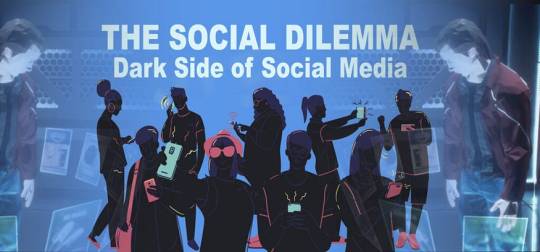
We’re living in a world where scrolling through social media feeds has become as habitual as breathing. The eye-opening Netflix documentary “The Social Dilemma” emerges as a cautionary tale that uncovers the hidden realities behind our favourite online platforms. It delves into the depths of the social media abyss, exploring the dark side of social media and the invisible strings that pull at the minds and hearts of users worldwide. As we become entangled in the web of likes, comments, shares, subscriptions and retweets, it is imperative to reflect on the potentially harmful consequences they can have on individuals and society as a whole.
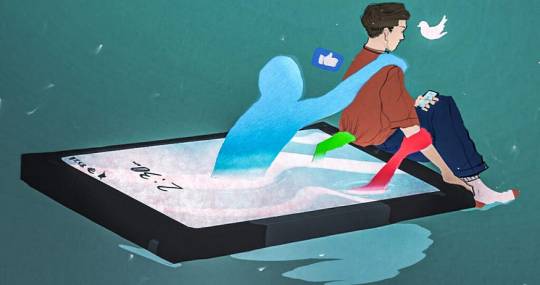
Addiction is a significant concern when it comes to social media use. These platforms are designed to be addictive, creating a dopamine-driven feedback loop that keeps users hooked.
“There are only two industries that call their customers ‘users’: illegal drugs and software.” – Edward TufteZ Renowned American Statistician and Professor
According to studies, excessive use of social media can lead to increased rates of depression, anxiety, and loneliness. The constant comparison to others and the pressure to maintain a perfect online image can lead to low self-esteem and negative self-perception.
These Social Media sites have their own algorithms that show users content they are more likely to agree with and interact with, which can lead to the reinforcement of existing beliefs and the amplification of extreme opinions. Polarization and the decline of respectful conversations can be attributed to social media algorithms that create echo chambers.
The spread of misinformation and fake news on social media has become a significant problem, contributing to the public’s mistrust of traditional media and institutions. The platform’s algorithms prioritize engagement, inadvertently promoting sensationalist and misleading content.
The personal data of users is collected and monetized by social media platforms, as they gather information about their interests, preferences, and online behaviour. This data is then sold to advertisers, who use it to create targeted ads that cater to the specific desires and needs of each user. This practice raises concerns about privacy, as individuals may not be fully aware of the extent to which their data is being used and shared. Furthermore, the use of personal data for targeted advertising opens the door for potential manipulation, as advertisers and platforms can influence users’ purchasing decisions and even their opinions on various topics.
“If you’re not paying for the product, you are the product.” –Shoshana Zuboff Author of “The Age of Surveillance Capitalism”

The Documentary talks about “The attention economy”, which monetizes users’ time and attention, leading to the development of addictive platforms that prioritize engagement over well-being.
It also delves into the algorithms that influence users’ behaviour and beliefs. These algorithms are designed to predict and manipulate users’ interests, creating a personalized online experience. This customization comes at the cost of ethical concerns, as it can exploit vulnerabilities and manipulate emotions.

Our journey into the digital abyss takes an intriguing turn when we consider the rise of artificial intelligence (AI). Notable figures in the tech world and beyond have expressed their apprehensions about the pervasive spread and potential misuse of AI technologies.
Geoffrey Hinton, the acclaimed pioneer of AI, has expressed his fears concerning AI’s unchecked growth. He cautions that as AI systems become more powerful and autonomous, they could potentially be used maliciously, leading to devastating effects. Hinton suggests that AI, if unregulated, could enable oppressive surveillance, enhance the spread of misinformation, or even facilitate autonomous weapons. The ‘Godfather of AI’ urges for safeguards and ethical guidelines to prevent such possible misuse and to ensure that the technology is employed to benefit humanity.
US President Joe Biden, acknowledging these concerns, summoned top tech executives including Google’s Sundar Pichai and Microsoft’s Satya Nadella to discuss AI’s safety mechanisms and to tackle the rising threats posed by this rapidly advancing technology. The goal was clear: to ensure the tech giants are taking necessary precautions against the potential dangers of AI and to establish more robust regulations to protect the public from AI-induced risks.
The world of finance is not oblivious to the rising power of AI. Legendary investor Warren Buffet has compared AI to an “atom bomb” due to its potential destructive capabilities. Buffet’s apprehensions stem from AI’s power to outperform humans in various tasks, its autonomy, and the potential for it to be exploited for harmful purposes. Despite these concerns, Buffet acknowledges the transformative potential of AI, especially in industries like healthcare and automotive.
AI, like social media, represents a powerful tool that holds both immense promise and potential threats. As users of technology and as a society, it’s crucial to stay informed, critical, and demanding of ethical considerations in these fields. As we navigate through this new age of AI, let’s tread with caution, but also embrace the potential benefits and transformations AI can bring about.
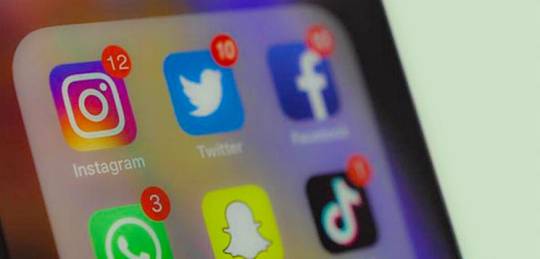
Following the release of “The Social Dilemma,” the public response was significant, leading to a broader conversation about the role of social media in society. Social media giants, including Facebook, have been forced to address concerns raised in the documentary.
In response to the film, Facebook published an article titled “What The Social Dilemma Gets Wrong,” which attempted to counter some of the documentary’s claims and highlight the steps the company has taken to address user concerns.
Facebook argued that the documentary misrepresented certain aspects of its platform, such as the company’s commitment to combating misinformation and protecting user privacy. Facebook also highlighted the steps they have taken to address user concerns, such as implementing changes to their algorithms and developing new tools to promote user well-being.

This eye-opening documentary has started important discussions about the ethical issues and social impact of our online activities. By revealing the hidden forces that control these platforms, the film….
To read the full article: https://dsb.edu.in/the-social-dilemma-dark-side-of-social-media/?utm_source=Tumblr&utm_medium=Tumblr&utm_campaign=social+dilemma
#social media#dilemma#netflix#facebook#social dilemma#ai#india#jobs#blockchain#google#education#banking#gpt 4#fintech#chatgpt#politics#saas technology#tech#technology
1 note
·
View note
Text
#social media#social dilemma#tumblr polls#polls#actual polls#mass media#communication#twitter#tumblr#facebook#instagram
0 notes
Text
Society / Peoples / Being judged by peoples / Hope/ Uniqueness/Trends/
So many things are going on...
Hmm...
And these things
Hmm
Oh
Ah
Hum
Haam
Haa
Oo
Mm
M
Ok
Kk
K
Okk
Hoo
Etc etc....
These things never ends..
And here comes the real deal
"Social media"
Here i am talking about social media in social media 😅
So many beautiful things ended when social media came to the people.
First is
Communication
The real communication converted to Text messages.
So in the text messages we can see so many types of things. First is the
"The Influencer"
Actually the Influencers rule the social media so you may be thinking what is this thing
Who is an influencer?
The Influencer is the one who text perfectly like a real talker it means they actually text like a influencer.
It means first they start the conversation with a mess I mean they mess with them.
Then step by step they close to the personal life.
The process we can see is in real life the Influencer first talk to a certain person then they mess with them then the Influencer influence that person in social media.
If the text messages don't exist in the first place the person hate the stranger influencer
Then they don't meet
If they meet the person don't even talk with influencer
The Influencer will try but that would not work
But in social media the Influencer win
In real life the Influencer don't work with a complete stranger
I mean they don't win because the person try to distance with the stranger influencer
But sometimes the Influencer will work in real life that is in another case.
In coming to social media the text influencer always win.
Ok Then next is
"The innocent Ones"
When coming to innocent Ones
In real life they actually try to talk and make a bond with a complete stranger
In a certain situations not like public places or something then coming to text messages they fail to maintain the bond
They always seek help for messaging that person
But what if the social media don't exist what will happen to innocent Ones
Are they success to keep the bond with a stranger?
I don't know
You say
#my writing#my words#my thoughts#reality#mindless#blog post#reading#social media#social dilemma#trending#my opinion#innocentdreamies
0 notes
Text
thinking about taking a little bit of a step back from social media for a bit for mental/physical health reasons (as in: chronic severe anxiety is causing chronic health issues and I need to remove stress Somehow). I will still post art but I’m probably gonna make an effort to engage with my dash only minimally, if at all. (that being said I have very poor discipline so if you see me suddenly reblogging stuff out of nowhere just. roll with it)
#thinking about how social media doesn’t really give you the chance to choose when you’re ready to engage with the news#like I think the most healthy thing is to decide when you’re in an okay place to sit down and deal with the news#but social media is just. constant whiplash bombardment. advertisement cat video people are dying guilt trip fashion tiktok moral dilemma#anyways. dealing with some chronic pain/gi/minor dysautonomia stuff#and it is looking like the cause is a mix of hypermobile joint issues#and the side effects of being chronically stressed out and anxious for. literally my entire life#as in night terrors as a kid insomnia since infancy panic attacks starting in middle school type chronic anxiety#turns out the body being switched into fight or flight mode Constantly does in fact. fuck things up a little bit#there’s only just starting to be research into this but from how my doc explained it my nervous system is a little bit. busted#ANYWAYS. not to overshare. point is chronic health issues caused by chronic stress equals I need to get off social media#and as a disclaimer I have been to therapy (a lot) and I am on anxiety meds but my body physically does not know how to chill out#so removing stressors it is
25 notes
·
View notes
Text
i just finished binging the 8 show and i NEED u reading this to also watch it.
Its so good.
#Its social commentary but in the guise of a drama like squid games but even better#Smaller budget tho but super great#Cinematography aswel rly great#Ethical dilemmas>>>>#Capatism dismanteld#Classism n shit#Drama#Its the more adult version of squid games#Its more leaning twoards 1985 and the platform etc#Loved it highly recomend#The 8 show#Kdrama
41 notes
·
View notes
Text
Hey!! It's Teddie again, welcome back. Today we're talking software.
When I hear the word software, it’s really hard to come up with any kind of tangible definition. I know of computer software, that it exists, and that I probably see it every day, but I couldn’t explain to you exactly what it is or where it might be hiding. I think of the tiny panels inside my phone, circuit boards glued together with tiny signals somehow wirelessly escaping my little interface and travelling around the world to deliver bits of information. Thankfully, in his book Software Takes Command Lev Manovich reveals that software isn’t the mystical fibre optic cables or hard drives; instead, it’s actually the thing that brings the hard-wired confusion of computer science to meet the real, living world — “the very grounds and ‘stuff’ of media design”, Manovich quotes a colleague. But not only is it “stuff”, it’s also the very thing that connects us to everything digital, from Google to Photoshop, Facebook to the compass app on your phone (that I know you never use). Ironically, something that people (myself included) know so little about is the only key to accessing the seemingly endless stream of information coming from the internet and other digital tools.
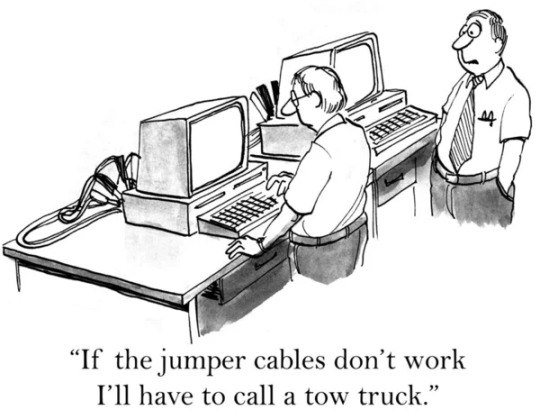
It’s for this exact reason, as Manovich points out, that software is constantly affecting and being affected by culture and society. Similar to the back and forth of art and literature, software is ever changing alongside cultural shifts in values and interests, serving as both a catalyst and a response to societal changes. But arguably unlike the arts, software reaches across the globe to impact billions of lives simultaneously, influencing a globalize society at the click of a button (or however it is the developers create software updates). It’s interesting to think about how a key driver of societal change is consciously being designed and redesigned for us consumers.

Although I can’t say it is the primary goal of software developers to generate large-scale societal shifts, I find it particularly interesting that they have that power to do so. Manovich describes, for example, a shift in privacy in the 2000s: “the boundary between “personal information” and “public information” has been reconfigured as people started to routinely place their media on media sharing sites, and also communicate with others on social networks.” When software introduces us to new (seemingly harmless) tools, such as an option to share a file, it can quickly take affect on society and, in this case, debase previously long-lasting values (such as that of privacy). A similar, more drastic effect came from the eruption of social media, as people were encouraged to spend more of their time sharing their lives rather than actually living them. Then, as Manovich mentions, these social affects can be taken advantage of; “By encouraging users to conduct larger parts of their social and cultural lives on their sites, these services can both sell more adds to more people and ensure the continuous growth of their user base.” Now, not only does a select community of people have a huge power over social and cultural change, but also they can enact changes that only they get rewarded for.

While software is far from the first or only thing initiating these cultural shifts, software is among the first to accept immediate feedback through engagement (and non-engagement) and human attention — while we can’t (or at least, don’t) dip our brushes into the drying paint of a Picasso to change its colours, we can engage with software to support or prevent its growth in the digital world. When we like a friend’s photo on Instagram, or click on an ad, we actively lay out a pattern of what software was successful and what wasn’t, not only through the type of interaction but also in whether we interact at all; and this data allows software to conform so tightly to common social and cultural values in a way that arts could never. In a similar way, engagement gives software an ‘insider access’ to human behaviour, giving it a power to shape the way we conduct our lives without even intending to. It’s interesting to think that something we know so little about knows and affects so much of the way we live.

*if you find these kinds of discussions interesting, I highly recommend watching “The Social Dilemma” on Netflix - it talks all about the role of the internet and globalization on the real world!
#social dilemma#software#software takes command#google#photoshop#engagement#globalization#softwarization#digitalization#internet#teddie speaks the truth
4 notes
·
View notes
Text
vento aureo didnt have enough casual bruno body horror. i think he should have kept unzipping himself and pulling out treats whenever narancia and mista started acting up to distract them while giorno has to watch and regret his choices
#bruno: giorno would you also like a treat#giorno(fighting for his life trying to work out how to navigate mafia social dilemmas without causing offense): no thank you i dont eat food
9 notes
·
View notes